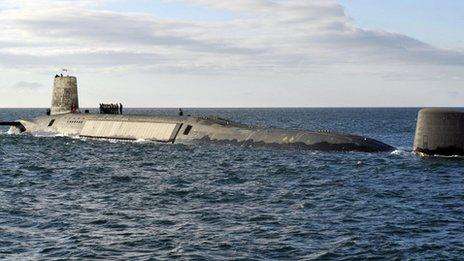Keeping Trident nuclear weapons 'in UK's national interest'
- Published
- comments
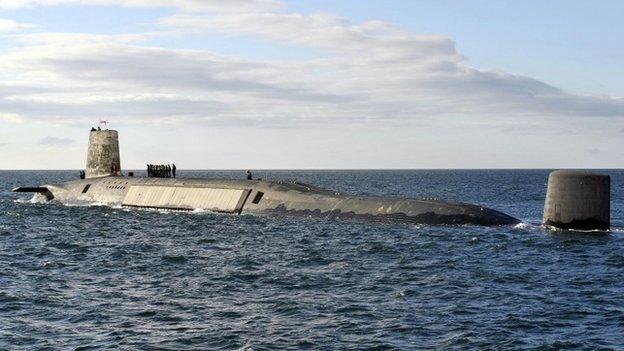
At the moment there is always one nuclear armed submarine on patrol
It is in the UK's national interest to keep the Trident nuclear weapons system, a group of former ministers, diplomats and generals have argued.
The Trident Commission says holding on to nuclear weapons could help deter threats to the UK's security in future.
But it said continuous patrols could be relaxed if the UK showed it was serious about working towards further international disarmament.
A final decision on whether to renew Trident will be taken in 2016.
The decision has been put back until after the 2015 elections following disagreements between the Conservatives and the Liberal Democrats.
While David Cameron supports the like-for-like renewal of the UK's existing submarine-based ballistic missile system, the Lib Dems say the same level of protection could be afforded if the number of submarines was reduced from four to three to save money.
Credible threats
Former Liberal Democrat leader Sir Menzies Campbell, also a commission member, said: "There's evidence to suggest that technical advances may allow it to be possible with three boats - it's all about the re-fitting schedule of the submarines."
However, Admiral Sir George Zambellas, head of the Royal Navy, argued that four boats would deliver "100% availability".
"A posture which delivers less than 100% availability is... not credible - not just in the eyes of potential adversaries, but in the eyes of our key strategic partners as well," he said in a keynote speech at the Royal United Services Institutes' International Sea Power Conference 2014.
Sir Menzies Campbell: Trident "an effective deterrent"
Shadow defence secretary Vernon Coaker welcomed the commission's recommendation that it was in the UK's national interest to retain a nuclear deterrent.
But SNP defence spokesman Angus Robertson said the only way Scotland could get rid of Trident was to vote "Yes" in the Scottish independence referendum on 18 September.
He said the SNP had not been involved in the cross-party talks. "We would certainly not have agreed to the conclusion of the commission," he said.
Publishing its report, The Trident Commission said it believed that "retaining and deploying a nuclear arsenal" was necessary to protect the UK and to fulfil the country's international responsibilities as a Nato member.
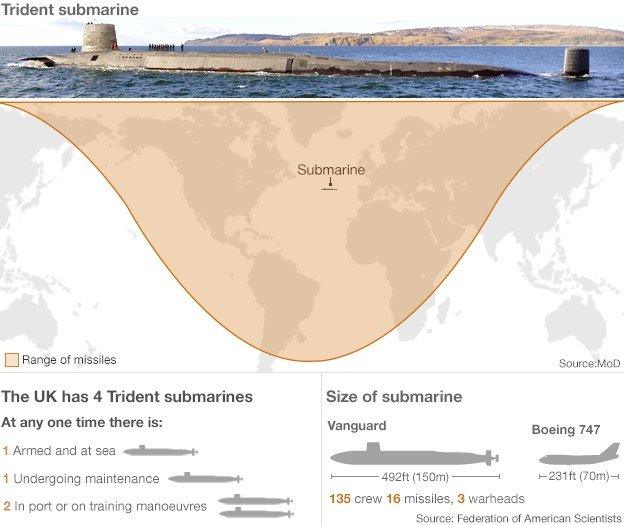
It said Trident met the "criteria of credibility, scale, survivability, reach and readiness" and alternative delivery options touted "simply on the basis of possible but speculative cost savings" should not be contemplated.
The commission's members include former Conservative foreign secretary Sir Malcolm Rifkind, former Labour defence secretary Lord Browne and former Lib Dem leader Sir Menzies Campbell, as well as former Chief of the Defence Staff Lord Guthrie and Sir Jeremy Greenstock, UK ambassador to the United Nations.
Their report stated that a nuclear capability should not be justified on the grounds of it being an "insurance policy" against an uncertain future or to maintain Britain's diplomatic standing in the world.
The rationale for keeping Trident, it added, lay in its ability to counter "credible" threats to the UK's security.
It identified three scenarios in which such threats could arise; from a long-standing nuclear state with an "aggressive posture"; from an existing or emerging nuclear state which "enters into direct strategic competition with the UK"; a "massive overwhelming" threat involving weapons of mass destruction.
"If there is more than a negligible chance that the possession of nuclear weapons might play a decisive future role in the defence of the UK and its allies in preventing nuclear blackmail, or in affecting the wider security context within which the UK sits, then they should be retained," the report stated.
"The impact of the UK's falling victim to ongoing strategic blackmail or nuclear attack is so significant that, even if the chances appear slim today, there is sufficient uncertainty surrounding the prospect that it would be imprudent to abandon system that have a high capacity to counter such threats."
'Always at sea'
The commission was divided over the question of whether the current practice of always having one submarine at sea at any other time should be maintained.
Some members argued that continuous-at-sea patrolling should continue until there was an "improvement in the security environment" while others argued that without a direct threat to the UK's interests, this could happen immediately while retaining the capacity for increased patrols at times of crisis.
But the commission was united in its call for the UK to consider what it could do to further the cause of nuclear disarmament and to discourage proliferation.
While acknowledging the steps that had been taken since the end of the Cold War, it said the UK could consider a further reduction in missile and warhead numbers, enhanced verification procedures and commitments to control or decrease stocks of fissile materials.
"The commission would recommend that the Ministry of Defence study the steps down the nuclear ladder more thoroughly to give greater confidence to the international community that we are considering such steps seriously in preparation for multilateral disarmament negotiations," it said.
- Published30 June 2014
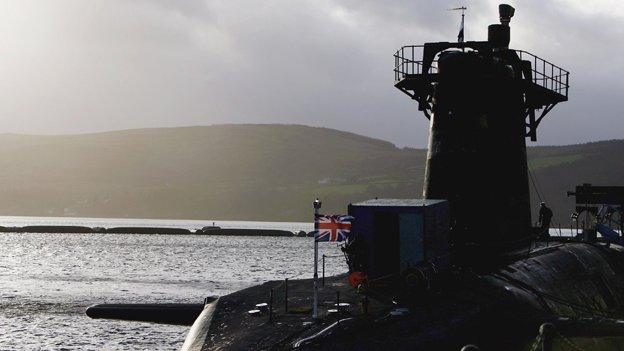
- Published31 January 2014

- Published30 June 2013
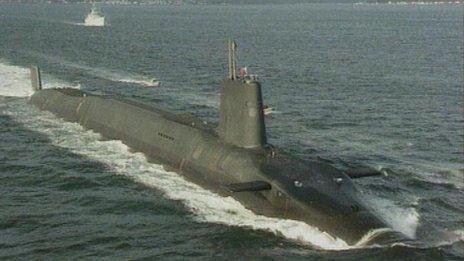
- Published16 July 2013
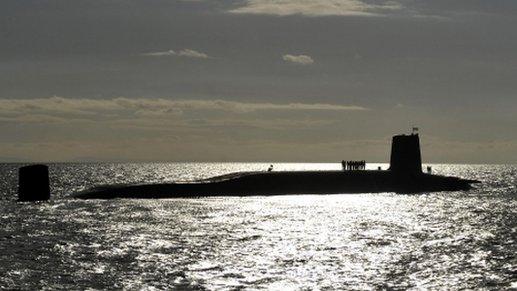
- Published23 May 2017
